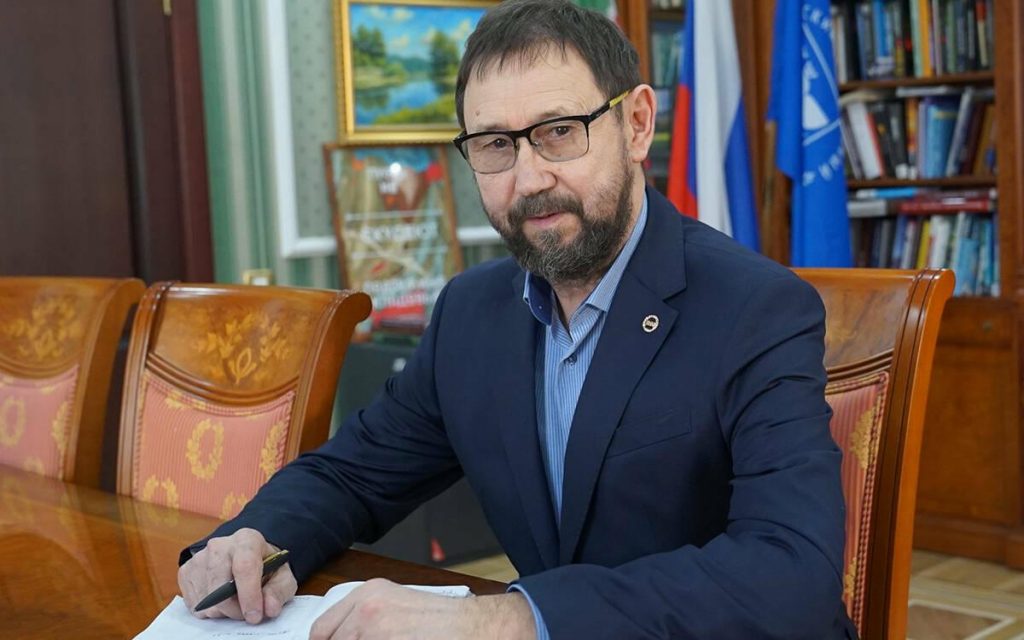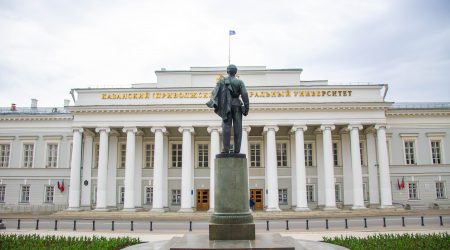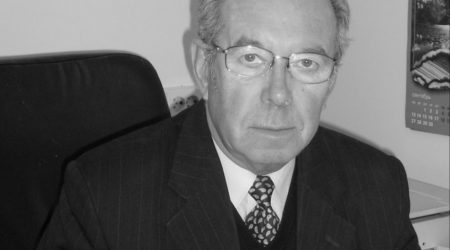Danis Nurgaliev: “We are using the method that I invented in my student years to look for oil”

On Geologist Day (first Sunday of April), Vice-Rector for Earth Sciences, Distinguished Scientist of Russia and Tatarstan, Doctor of Sciences in Geology in Mineralogy, Professor Danis Nurgalev speaks about his life in science and the current affairs at the Institute of Geology and Petroleum Technologies.
“When I was a kid, in our village of Tatyshly in Bashkiria, where I lived, geophysicists were conducting seismic surveys. My friends and I were curious to know what they were doing, and we often watched them work. I had no thoughts of becoming a geologist at that time, although since childhood I loved to collect and study rocks, to look for something in the ground. After school I came to enroll at the Faculty of Mechanics and Mathematics of Kazan University and accidentally learned that the university has the Faculty of Geology that trains geophysicists. I asked: “And who are geophysicists?” They explained to me that they are physicists who work outdoors. And I decided that’s what I needed. Fifty-two years later, I have never once regretted choosing geophysics,” says the Vice-Rector about his choice of profession.
The idea to detect oil using a magnetic field came to student Nurgaliev when he was interning on the Mangashlyk Peninsula in Kazakhstan.
“We were doing an aeromagnetic survey to study the structure of the sedimentary cover to look for oil. And I wondered whether magnetic fields could be used for direct oil prospecting. This idea arose because I saw several wells in which the sedimentary rocks were quite strongly magnetic and not magnetic at all. I began to think about whether oil could affect the magnetic properties. I read papers on the mineralogy of rocks from uranium deposits formed at the site of destroyed oil deposits. Took collections of bituminous rocks from the petroleum department and measured their magnetic properties. It worked, and I even sent my research to a competition, but that’s another story,” explains the scientist.
In the 4th (penultimate) year, the course work of a future geophysicist was devoted to the search for oil using the magnetic method. The year was 1976.
“After that I developed this theme for some time and even made an interesting substantiation of the method. Then I began to conduct research in paleomagnetism and abandoned the work on oil, even giving all the materials to my friend. At that time it was prestigious to be engaged in fundamental research. Indeed, paleomagnetism seemed global and fantastic. Magnetic field variations 250 million years ago. Cool! When I became vice-rector for science of the university, I returned to the topic of my course work. We went further and began to study magnetic field variations to search for oil deposits, that is, to use the method I invented when I was a student,” shares Dr Nurgaliev.
Nurgaliev’s field of scientific interests is very wide – he studies variations of the magnetic field in ancient times, cosmic dust, meteorites, the nature of global extinctions in the history of the Earth, bottom sediments of modern lakes, the processes of formation and destruction of oil and gas deposits, geodynamic processes of oil and gas bearing territories, enhanced oil recovery, methods of oil production and much more.
“Geology is not only the search, exploration and extraction of minerals. This science studies our planet as a whole: its atmosphere, hydrosphere, lithosphere, deep layers. The processes occurring in them, very much affect the life of mankind. The simplest example is landslides, floods, earthquakes, tsunamis, and volcanic eruptions,” adds the interviewee.
According to the scientist, geologists are engaged not only in the present, but also in the distant past of the Earth to understand what awaits our planet in the future, “For example, there is a lot of talk now about global warming, which is caused by the accumulation of carbon dioxide and other greenhouse gases in the atmosphere. Of course, warming is hard to feel today, but we can see that the climate has become unstable. There have already been periods of warming in the Earth’s past, and if we understand how the planet reacted to abrupt climate changes in different geological epochs, we can predict what will happen in the future.”
He recalled that several times in the history of the Earth there have been catastrophes that led to the death of all living things. By studying their scenarios, we can understand whether something similar awaits humanity in the future.
In the 21st century, mankind will actively develop the planets of the Solar system and their satellites, says the geophysicist, “We will be engaged in search, exploration and mining, and our descendants will live on these planets and produce oxygen there. I think it will be possible, at least partially, to restore the atmosphere on Mars. As for minerals, they will be mainly used to equip the planets where they will be mined. The rarest ones will probably start to be delivered to Earth. We have yet to build spacecraft that can transport water, materials necessary for life, and useful resources to other planets.”
The geology of today can do amazing things, says the Professor, because it develops rapidly, “It is impossible to imagine it without computer modeling, artificial intelligence and ultramodern devices, which were undreamed of 20-30 years ago. Artificial intelligence replaces humans in routine work, such as analyzing well, field, geophysical, seismic data, processing huge amounts of information.”
In March, the annual university ranking compiled by the British consulting company Quacquarelli Symonds was published. In it, KFU ranks 35th in Petroleum Engineering. Danis Nurgaliev explains the secret of success simply: an excellent interdisciplinary team of scientists and close interaction with business, the result of which is the rapid implementation of scientific developments into practice.
“We work with companies in terms of training students, as well as retraining and professional development of specialists of oil and gas companies. This tremendously increases the awareness about our brand in Russia and in the world,” sums up the academic.


